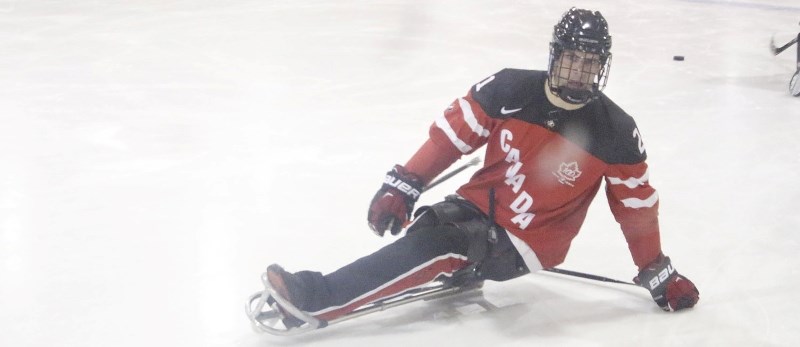“Scars should remind you of where you’ve been — they don’t need to dictate where you go…”
These were memorable words to wrap up a talk with a group of juniors registered in the Hockey Canada Skills Academy program Feb. 23 at Morley Community School (MCS).
The slogan is gospel to Canada’s National Sledge Team forward Chris Cederstrand — who ventured to the Morley high school this week to chat with the junior hockey kids (Grade 6-9) and give willing skaters a chance to give the sleds a whirl on the ice.
Sledge hockey is an innovative team sport that incorporates the same rules and principles as regular ice hockey, where the players sit on sleds or ‘sledges’ — with sled blades underneath the seat, using two sticks for passing, stick handling and shooting the puck.
The sport was invented in Sweden in the 1960s to accommodate participants with a physical disability who wished to continue to play ice hockey; sledge players battle with such disabilities as single and double above and below knee amputations, as well as affected lower body parts resulting from spina bifida.
It has become one of the most popular sports in the Paralympic Games.
“Aside from us sitting on the ground, there’s not a lot of differences,” explained Cederstrand to the Nation youth. “If anything, sledge is more physical.”
The six-foot-three elite athlete and former Western Hockey League (WHL) player shared his story of forging ahead in the face of adversity.
The Martensville, Sask. native grew up on skates, moving on to a higher level of playing by his early teens.
Following a two-year run with the Red Deer Rebels then being traded to the Swift Current Broncos, Cederstrand’s WHL career was cut short by a battle with concussion problems.
By 2004, he was attending fire school in Vermillion, where he finished at the top of his class. Upon graduation, he and now-wife Shannon relocated to Calgary where he began to work in road construction as he was applying for firefighting positions in and around the city.
An accident with a piece of heavy machinery left Cederstrand no choice but to jump off a rolling packer — only to be partly caught underneath the 30,000-kg machine.
An emergency surgery that saved his life also saw his right leg amputated above the knee.
Following a grueling four-year recovery process that saw the athlete getting off pain medication and working through the mental and emotional turmoil of having the course of his life significantly altered, Cederstrand trumped adversity and is celebrating his new lease on life with his wife and two young children, Kasey and Carter, in Okotoks.
After less than four years of his journey into sledge hockey, Cederstrand was drafted to Team Canada last month.
He is also the first above-knee amputee firefighter in North America (with the MD of Foothills Fire Department) — thanks in part to the fundraising efforts of his family and friends for an ‘Otto Bock X3’ prosthetic leg with a $100,000 price tag. He continues to battle physical pain as a result of nerve damage on a daily basis — without the use of pain meds. This fuels his passion to engage with youth and motivate them to keep moving forward.
“With what I’ve learned through my experiences, you can never give up — you create your own destiny.”
It’s a story that may resonate with some Morley youth — where strong school attendance is a struggle for many.
“This program is going to revitalize the minor hockey community in Morley,” said enthused MCS teacher and program coach Shane Maguire, who runs the program with fellow teacher Emily Parkin.
Both teachers are hopeful the community will take the initiative to ramp up a Morley hockey team once again.
This is the second year for the Hockey Canada program in Morley — a community filled with budding athletes that has gone without a Nation-based team since the 2008/09 season; last year was the first year for the junior skills program and this is the year for the senior program (Grade 10-12).
According to MCS principal Wes Malo, the program is growing in leaps and bounds and has been successful at reeling in students whose interest in attending school had drastically declined; there are 24 junior program registrants and 15 seniors.
“Stoney Tribal Administration (STA) has been very helpful and supportive of this program,” said Malo, adding that STA and the Stoney Education Authority have worked together to get the program running and perform necessary reparations to the Morley arena located next to the school — including ice and board repairs.
There is also some cost sharing with MCS to maintain the ice; community hockey advocate Marty Wildman manages the rink.
“The bar is set high for these kids as student athletes,” said Malo, adding that maintaining a minimum 75 per cent attendance record, demonstrating good behaviour and keeping up with their academics are all components.
No skating experience is necessary to register in the skills-based program.
Cederstrand credits fellow Team Canada teammate, defenseman Kieran Block, for pushing him into the sport.
While uncertain at first, Cederstrand said that his passion quickly grew for the challenging, physical sport of sledge hockey — he is noted for his powerful physicality and size on the ice.
Cederstrand now has his eye on the grand prize — the gold medal at the 2018 Winter Paralympics in Pyeongchang, South Korea.




